Toolkits
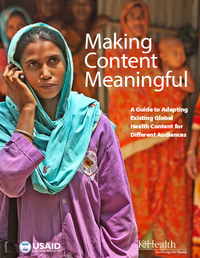
Making Content Meaningful: A Guide to Adapting Existing Global Health Content for Different Audiences
The abundance of openly accessible health content—from eLearning courses and multimedia resources to guidance documents and research papers—presents a remarkable opportunity for teaching, learning, and sharing. Open health content, however, is not sufficient by itself. It is important to provide it in the appropriate context and the language of the people who will use it. The Knowledge for Health (K4Health)project developed this adaptation guide to expand the reach, usefulness, and use of evidence-based global health content, specifically as it relates to family planning. The guide outlines a framework with key steps and questions for consideration as well as activity sheets and an illustrative as well as real-life case studies that will help a user in making informed decisions in the content adaptation process.
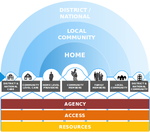
Community Health Framework
The Community Health Framework assists non-technical audiences in understanding community health and how it can be strengthened. An interactive power point, published under a Creative Commons license, it depicts the community health ecosystem as heath-specific and health-enabling actors and structures (formal and informal) working together to ensure that each has the agency, access, and resources to ensure the health of community members. It also includes a Toolkit with models and case studies as examples of good practice.
Download the PDF version [4.7 Mb] or PPT version [7.7 Mb]
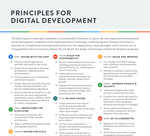
Principles for Digital Development
The Principles for Digital Development (in English, Español, Français, or Português) find their roots in the efforts of individuals, development organizations, and donors alike who have called for a more concerted effort by donors and implementing partners to institutionalize lessons learned in the use of information and communication technologies (ICTs) in development projects. They were written by and for international development donors and their implementing partners, but are freely available for use by all. ThePrinciples are intended to serve as guidance rather than edict, and to be updated and refined over time.
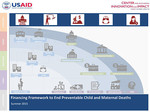
Financing Framework to End Preventable Child and Maternal Deaths (EPCMD)
The U.S. Government is committed to achieving the once unimaginable goal of Ending Preventable Child and Maternal Deaths (EPCMD) by 2035. Achieving this goal in a sustainable fashion implies a gradual move toward solutions that mobilize both domestic and international resources, with the objective of putting developing country health systems on a trajectory toward financial sustainability.
The Financing Framework is designed to outline ways in which additional financial resources and tools can be utilized to support sustainability. The Framework draws on inspiration from best practices used throughout the U.S. Agency for International Development and with our health partners around the world.
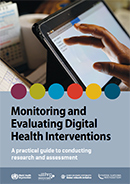
WHO: Monitoring and evaluating digital health interventions - A practical guide to conducting research and assessment
This resource on Monitoring and Evaluating Digital Health Interventions provides step-wise guidance to improve the quality and value of monitoring and evaluation (M&E) efforts in the context of digital health interventions, also commonly referred to as mHealth or eHealth interventions. This Guide is intended for implementers and researchers of digital health activities, as well as policy-makers seeking to understand the various stages and opportunities for systematically monitoring implementation fidelity and for evaluating the impact of digital health interventions.
